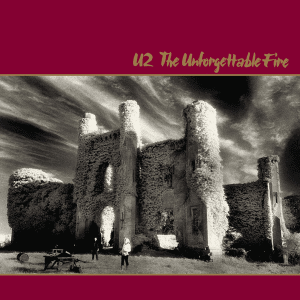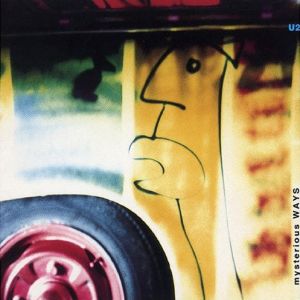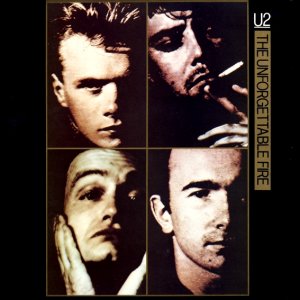
The Unforgettable Fire is the fourth studio album by Irish rock band U2. It was produced by Brian Eno and Daniel Lanois, and released on 1 October 1984 by Island Records. The band wanted to pursue a new musical direction following the harder-hitting rock of their previous album, War (1983). As a result, they employed Eno and Lanois to produce and assist in their experimentation with a more ambient sound. The resulting change in direction was at the time the band's most dramatic. The album's title is a reference to "The Unforgettable Fire", an art exhibit about the atomic bombing of Hiroshima.

Wide Awake in America is a four-track extended play by Irish rock band U2. It was released on 20 May 1985 through Island Records. It combines two live performances of songs from the group's 1984 album The Unforgettable Fire with two B-sides from the era, which had previously been available only in the United Kingdom. Wide Awake in America was originally released only in North America and Japan but it charted in the UK as an import. It was re-released internationally in 1990.

"I Will Follow" is a song by rock band U2. It is the opening track from their debut album, Boy, and it was released as the album's second single in October 1980. Lead singer Bono wrote the lyrics to "I Will Follow" in tribute to his mother, who died when he was 14 years old.

"With or Without You" is a song by Irish rock band U2. It is the third track on their fifth studio album, The Joshua Tree (1987), and was released as the album's lead single on 16 March 1987. The song was the group's most successful single at the time, becoming their first number-one hit in both the United States and Canada by topping the Billboard Hot 100 for three weeks and the RPM national singles chart for one week, with a further three weeks at number two.

"Mysterious Ways" is a song by Irish rock band U2. It is the eighth track from their 1991 album, Achtung Baby, and was released as the album's second single on 2 December 1991. The song began as an improvisation called "Sick Puppy", with the band liking only the bass part that bassist Adam Clayton composed. The band struggled to build a song from it, with vocalist Bono and producer Daniel Lanois arguing intensely during one songwriting session. The song's breakthrough came after guitarist the Edge began experimenting with the Korg A3 effects unit. "Mysterious Ways" features a danceable beat, funky guitar hook, and conga-laden percussion, as well as mystical lyrics by Bono about romance and women.

"The Unforgettable Fire" is a song by Irish rock band U2. It is the title track of their fourth album (1984), and was released as the album's second single in April 1985. The band cited an art exhibition by victims of the atomic bombings of Hiroshima and Nagasaki that was held at The Peace Museum in Chicago as the lyrical inspiration for the song. It became U2's first number one single in Ireland, their third top-ten hit in the United Kingdom, reaching number six on the UK Singles Chart, and reached number eight on the Dutch singles chart.

"Pride (In the Name of Love)" is a song by Irish rock band U2. It is the second track on the band's 1984 album, The Unforgettable Fire, and was released as its lead single in September 1984. The song was produced by Brian Eno and Daniel Lanois. Written about the American civil rights leader Martin Luther King Jr., "Pride" received mixed critical reviews at the time, but it was a major commercial success for U2 and has since become one of their most popular songs, as well as been re-evaluated positively by many as one of the greatest songs of all time. It appeared on the band's compilation albums The Best of 1980–1990 and U218 Singles and was reworked and re-recorded for Songs of Surrender (2023).

"11 O'Clock Tick Tock" is a song by Irish rock band U2. It was released as a single on 16 May 1980, and was produced by Martin Hannett. It followed their debut EP Three and the single "Another Day." It was the group's first release for Island Records. The song's lyrics were written by lead vocalist Bono based on his experience at a Cramps concert in London, where he watched a "lifeless, goth-style" crowd from the balcony.

The Unforgettable Fire Tour was a concert tour by Irish rock band U2 that took place in 1984 and 1985 in support of band's album The Unforgettable Fire. Beginning in August 1984 with the band's first tour to Australia and New Zealand, the tour spanned four further legs which included 43 concerts in Europe and 50 in North America.
"Bad" is a song by Irish rock band U2 and the seventh track on their 1984 album, The Unforgettable Fire. Thematically, the song is about heroin addiction, though lead vocalist Bono has given varying accounts of who was the inspiration behind his lyrics. "Bad" is considered a fan favourite and is one of U2's most frequently performed songs in concert. The band's 12-minute performance of the song at the Live Aid charity concert in 1985 was a breakthrough moment for them.
"4th of July" is a song by Irish rock band U2, and is the sixth track from their 1984 album, The Unforgettable Fire. The song is an instrumental ambient track that was spontaneously improvised by bassist Adam Clayton and guitarist the Edge while producers Brian Eno and Daniel Lanois recorded, unbeknownst to the band. It has never been performed live, although Clayton did play it as a warm-up during a soundcheck before U2's concert in San Jose on 20 April 2001.
"New York" is the tenth track from U2's 2000 album, All That You Can't Leave Behind. It is notable as the subject matter is a picturesque description of New York City and of the people who live there, and was later altered following the events of September 11, 2001. The song's lyrics were written by lead singer Bono, who has a residence in New York City.
"One Step Closer" is a song by Irish rock band U2, and is the ninth track on their 2004 studio album, How to Dismantle an Atomic Bomb.
"Elvis Presley and America" is a song by Irish rock band U2, and is the ninth track on their 1984 album, The Unforgettable Fire.
"Wild Honey" is a song by the rock band U2. It is the seventh track on their 2000 album All That You Can't Leave Behind. The song was played eleven times during the Elevation Tour.

"Magnificent" is a song by U2. It is the second track on the band's 2009 album No Line on the Horizon and was released as the album's second single. The song was originally titled "French Disco", but was renamed later in the recording sessions. It is played before the start of every New York Rangers home game at Madison Square Garden.
"No Line on the Horizon" is a song by rock band U2; it is the opening and title track on their 2009 album No Line on the Horizon. An alternate version, "No Line on the Horizon 2", was included as a bonus track on some versions of the album. The song was developed during the band's earliest sessions in Fez, Morocco, and began with a drum beat by drummer Larry Mullen, Jr. The lyrics were inspired by a photograph of Lake Constance, titled Boden Sea. Many reviews of the song compared it to the band's other guitar-heavy songs, including "Elevation", "Vertigo", "Zoo Station", and "The Fly".
"Moment of Surrender" is a song by rock band U2 and the third track on their 2009 album No Line on the Horizon. During the initial recording sessions for the album in 2007 in Fez, Morocco, the band wrote the song with producers Brian Eno and Daniel Lanois within a few hours. Together, they recorded the song in a single take; Eno called the song's recording "the most amazing studio experience [he's] ever had". According to him and Lanois, the track is the closest the band came to realising their original concept for the album of writing "future hymns". The seven-minute song features gospel-like vocals in the chorus, along with a predominantly organ- and piano-based musical accompaniment. Lyrically, the song is about a drug addict who is undergoing a crisis of faith.
"Unknown Caller" is a song by Irish rock band U2 and the fourth track on their 2009 album No Line on the Horizon. It was written from the perspective of a drug addict, who begins to receive bizarre text messages on his cellphone. The song was developed very early during the No Line on the Horizon sessions, and was recorded in a single take.









